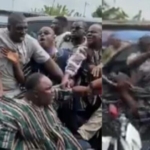
The Ablekuma North parliamentary election rerun, marred by shocking violence and an assault on former Member of Parliament Hawa Koomson, has put a dark stain on Ghana’s democratic landscape. This incident, following a prolonged impasse after the December 7, 2024 general elections, marks a turning point. It demands a thorough and objective examination of the forces that continually threaten the nation’s hard-won peace and stability.
A Troubling History of Electoral Violence
Ghana boasts a commendable record of peaceful transitions of power, a beacon in a region often plagued by political instability. However, electoral violence has persistently tainted its otherwise positive democratic record. Each election cycle, from general elections to by-elections and reruns, has seen varying degrees of unrest. The use of political vigilante groups by the two major parties, the New Patriotic Party (NPP) and the National Democratic Congress (NDC), has been one of the primary driving factors for this turmoil.
The 2019 Ayawaso West Wuogon by-election, where nearly 20 people were shot in the process, is a reminder of this trend. This led to parliament approving the Vigilantism and Related Offenses Act of 2019, but its enforcement has been weak, with groups often rebranding to evade the law.
The 2020 elections also saw eight fatalities, and the December 2024 elections tragically resulted in at least six deaths, highlighting an escalation despite pledges for reform and accountability.
Security analyst Richard Kumadoe has noted that “Justice delayed is justice denied,” pointing out how the lack of prosecutions for past violence perpetuates a dangerous cycle of impunity.
A report by the Ghana Center for Democratic Development (CDD-Ghana) on the 2020 elections noted that victims of electoral violence are yet to receive justice despite persistent calls for investigations and speedy trials. This ongoing impunity is a key factor in the repetition of electoral violence in Ghana.
Additionally, the United States Embassy in Ghana, in a statement prior to the 2016 elections, condemned all political violence and warned that it would “consider all options to hold responsible those who incite political violence, including denying or revoking visas.” This puts the spotlight on international outrage and the potential for consequences for perpetrators.
The Ablekuma North Incident Unpacked
The scenes at St. Peter’s Society Methodist Church polling station was deeply alarming. A coordinated attack by unidentified “macho men” disrupted the rerun, forcing panic among voters and electoral personnel.
The assault on Hawa Koomson, captured in disturbing video footage, where she was reportedly stomped, is particularly egregious. Other victims included NPP parliamentary candidate Nana Akua Afriyie and a female party agent. The attack on a JOYNEWS reporter, slapped and pushed, further reflects the brazen disregard for law and order.
In the tightly contested race, the National Democratic Congress’ (NDC) Ewurabena Aubynn emerged victorious, wrestling the seat from the New Patriotic Party (NPP). Aubynn secured 34,090 votes, narrowly defeating the NPP’s Akua Afriyie, who received 33,881 votes. A total of 411 ballots cast were rejected.
Political Reactions and Accusations
Political reactions in Ghana reflect the deep-seated partisan divide that often fuels these incidents. Dr. Bawumia, the former Vice President, has condemned the violence, warning that normalizing it would put the country on a dangerous path.
Dr. Bawumia stated, “This will be a recipe for disaster if each political party will raise its own army.” He urged President John Mahama to ensure swift accountability for the perpetrators. (Statement by Dr. Bawumia, reported by various Ghanaian media outlets during the rerun)
However, the NDC’s Minister of Communication Sam George said, “Someone should tell Bawumia to shut up. What did he say about Ayawaso West Wuogon in 2019?” This showcases the deep-seated political blame game, where past incidents are weaponized rather than serving as lessons for collective action.
The Minority Caucus in Parliament, led by Alexander Afenyo-Markin, strongly accused the opposition NDC of orchestrating the violence, specifically naming Malik Basintale and Mustapha Gbande as instigators. Their statement asserted that such actions are “a direct attack on our democratic process,” depriving citizens of their constitutional right to representation.
Dr. Hannah Louisa Bissiw, the Administrator of the Minerals Development Fund, added another layer of complexity, claiming she was a past victim of political violence allegedly orchestrated by Madam Koomson during the Ayawaso West Wuogon by-election. According to Dr. Bissiw, “She came with about 30 thugs to me, I was beaten.” This accusation, while unverified in relation to the current incident, speaks to the cyclical nature of alleged political thuggery and revenge.
Ordinary Ghanaians Speak
For ordinary Ghanaians, the repeated incidents of electoral violence undermine trust in the democratic process and state institutions. Afrobarometer surveys show a decline in public confidence in the Electoral Commission. This, hitting its lowest level in over two decades. While a majority (64%) believed the 2020 election was generally free and fair, this was a significant drop from 2016 (87%).
The majority of Ghanaians are caught between the political rhetoric and physical violence. There is a sense of frustration that politicians, despite signing peace pacts, fail to uphold their commitments. Ghanaians are calling for accountability, reflecting a desire for justice and an end to impunity. The fear of citizens having to “devise their own individual means of protection” if the police fail to act decisively is a legitimate one.
A study on electoral violence in the Tamale metropolis discovered multifaceted root causes, with poverty being a leading factor, representing 34.8%.
The study confirmed that election-related violence has significant effects, including maiming, deaths, and destruction of property, and called for a comprehensive, multi-stakeholder approach to address the problem. This shows that beyond political rhetoric, socioeconomic factors play a crucial role in fueling these violent outbursts, especially among unemployed youth who are often recruited into vigilante groups.
Legal Ramifications and Constitutional Imperatives
The right to free and fair elections and the democratic ideals embedded in the Ghanaian constitution. Electoral violence amounts to a direct assault on these ideals. The Vigilantism and Related Offences Act, 2019 (Act 999), aims to disband armed partisan groups and criminalise vigilantism.
However, the recurring violence suggests a significant challenge in its enforcement. The police investigations into the Ablekuma North incident, including the assault on Hawa Koomson and the attack on journalists, are important tests of the state’s commitment to upholding the rule of law.
However, the broader issue of political figures or party members instigating violence requires more decisive action. The legal framework exists, but its effective enforcement remains a huge challenge.
The Attack on Journalists
The attacks on journalists during election coverage are a deeply concerning trend that directly undermines press freedom and the public’s right to information. The incidents involving the JOYNEWS journalist and the GHOne TV journalist in Ablekuma North are not isolated. The Committee to Protect Journalists (CPJ) and the International Federation of Journalists (IFJ) have documented multiple attacks on journalists in Ghana, particularly during elections. In February 2025, at least five journalists were attacked while covering the Council of State elections in the Ashanti Region, with assailants destroying equipment and deleting footage.
These attacks often occur with impunity. The Ghana Journalists Association (GJA) has consistently called for perpetrators to be prosecuted and has even released media blacklists against politicians who assault media workers. The GJA President, Albert Kwabena Dwumfour, has expressed concern about the slow pace of investigations into the murder of journalist Ahmed Suale, who was shot dead in 2019.
He signalled that the GJA may seek redress in international forums like the ECOWAS Community Court of Justice if no concrete progress is made. This demonstrates the severity of the impunity crisis and the potential for internationalisation of the issue if domestic mechanisms fail. The safety of journalists is extremely important to a healthy democracy.
A Path to Democratic Renewal
The Ablekuma North rerun incident is a reminder of the fragility of democratic gains when political actors resort to violence. There must be a genuine commitment from all the political parties to denounce and actively prevent violence, not just during elections but continuously. This includes holding their own members accountable.
The Electoral Commission must enhance security protocols for reruns and sensitive polling stations. Law enforcement agencies must act decisively and impartially, ensuring swift investigations and prosecutions regardless of political affiliation. Civil society and electoral watchdogs must continue to monitor and advocate for reforms. Ultimately, the long-term stability of Ghana’s democracy depends on a collective sense of commitment to prioritise peace, justice, and the rule of law above partisan politics.
